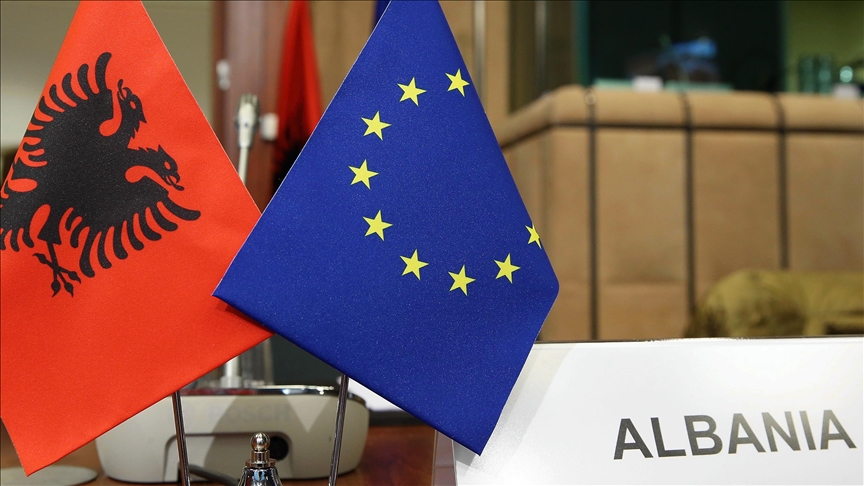Albania advances in EU accession talks with accelerated negotiations on key chapters

Albania is making significant progress in its path toward European Union membership, with negotiations moving forward at a steady and accelerated pace. Following the successful opening of Clusters 1 (“Fundamentals”) and 6 (“External Relations”) in 2024, the year 2025 has started with a strong focus on two crucial groups of chapters: Cluster 2 (“Internal Market”) and Cluster 3 (“Competitiveness and Inclusive Growth”).
Why is this important: The opening of negotiations on these 17 chapters is essential for Albania’s economic integration into the EU Single Market. The chapters cover key elements of Albania’s economic future, from market regulations and fair competition to policies ensuring inclusive growth and social welfare. With Albania aiming to be EU-ready by 2030, the latest developments indicate strong momentum, reinforced by political commitment at home and growing support from EU member states.
Context: The second group of negotiation chapters, which includes discussions on integrating Albania into the EU Internal Market, has been a central focus following the completion of the screening process with the European Commission.
In late January 2025, the member states of the EU, following a positive recommendation from the European Commission, officially endorsed Albania’s progress. Thr EU Polish Presidency invited the country to present its negotiating position on nine key economic and market-related chapters, effectively greenlighting the next stage of accession talks.
While an exact date for the start of technical negotiations in these areas is yet to be confirmed, sources indicate that discussions could begin in the coming months. This cluster includes negotiations on essential economic areas such as:
- Free movement of goods and services.
- Capital and labor mobility within the EU.
- Consumer protection and intellectual property rights.
- Competition policy and market regulations.
These areas are among the most crucial for Albania’s transition toward full membership, ensuring economic compatibility with the EU and enhancing business and trade opportunities.
On cluster 3: Alongside the momentum on economic integration, Albania has also received formal approval to advance negotiations on Cluster 3, which focuses on strengthening economic competitiveness and fostering inclusive growth. On February 12, 2025, the Polish Presidency of the EU sent an official letter requesting Albania to submit its negotiating position on this group of chapters.
This cluster includes policies aimed at enhancing Albania’s industrial and economic landscape in line with EU standards. The negotiations will focus on:
- Digital transformation and media (Chapter 10) – Aligning Albania’s digital economy with the EU’s technological framework.
- Taxation (Chapter 16) – Implementing fair and transparent tax policies.
- Economic and monetary policies (Chapter 17) – Strengthening fiscal discipline and financial market stability.
- Employment and social policies (Chapter 19) – Ensuring job market reforms and improved labor conditions.
- Enterprise and industrial policies (Chapter 20) – Fostering innovation and industrial competitiveness.
- Scientific research and innovation (Chapter 25) – Enhancing Albania’s research and technological development.
- Education and culture (Chapter 26) – Expanding educational cooperation and cultural exchanges with the EU.
- Customs Union (Chapter 29) – Facilitating trade through the harmonization of customs regulations.
- These negotiations are expected to accelerate Albania’s economic development by promoting innovation, increasing industrial competitiveness, and ensuring sustainable social policies that align with the EU’s economic model.
What else: The Albanian government, parliament, judiciary, and all relevant institutions have reaffirmed their unwavering commitment to continuing reforms necessary for EU accession. The goal remains clear: to ensure Albania is fully prepared for EU membership by 2030.
The opposition has also signaled its support for the EU accession process, consistently stating that it will not obstruct negotiations and has shown willingness to cooperate on matters related to European integration.
Albania’s accelerated progress has been recognized at the EU level. The unwavering backing from the European Commission, coupled with the political will of the 27 member states, has created a favorable climate for Albania’s negotiations.
The end of 2024 marked historic milestones with the opening of the first two groups of chapters (1 and 6), and 2025 is set to continue this momentum with the formal approval to proceed with negotiations on 17 additional chapters. This fast-tracked progress has been described as a “Big Bang” moment for Albania’s EU path, demonstrating a clear shift toward deeper integration into the European framework.
What’s next: With negotiations on two more group chapters (2 and 3) expected to begin soon, Albania enters one of the most intensive phases in its EU accession history. The road ahead requires continued reforms, technical preparation, and diplomatic engagement. However, the steady pace of negotiations and the growing alignment with EU policies indicate that Albania is closer than ever to its long-cherished goal of joining the European family.
The European integration process is proving to be a transformative force, shaping Albania’s economic landscape and governance standards to meet EU criteria. As negotiations advance, Albania’s path to full membership becomes clearer, reinforcing its place within a united and prosperous Europe.


